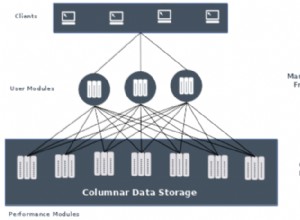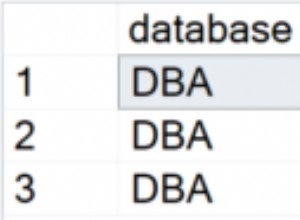Zaktualizowano SQL 2000 do SQL 2005 i przełączono na Microsoft SQL Server 2005 JDBC Driver w wersji 1.2. Otrzymałem błąd „Oświadczenie nie zwróciło wyniku” podczas wykonywania Insert, a następnie SELECT SCOPE_IDENTITY()”. Rozwiązałem problem za pomocą executeUpdate() i getGeneratedKeys zamiast executeQuery.Oto kod przed i po.
Uwaga:połączenie użyte w tym przykładzie to java.sql.connection, a nie com.microsoft.sqlserver.jdbc.SqlServerConnection.
Kod SQL 2000
String dbURL = "jdbc:sqlserver" + "://" + dbServer + ":" +
dbServerPort + ";SelectedMethod=cursor;databaseName="
+ dbName + ";user=xxx;password=xxx";
Class.forName("com.microsoft.sqlserver.jdbc.SQLServerDriver");
java.sql.Connection connection = DriverManager.getConnection(dbURL);
sql = "insert into Contact (name) values ('ABC'); SELECT SCOPE_IDENTITY()";
PreparedStatement ps = connection.prepareStatement(sql);
ResultSet rs = ps.executeQuery();
if (rs.next()) {
long id = rs.getLong(1);
System.out.println("Id=" + id);
}
Kod SQL 2005
String dbURL = "jdbc:sqlserver" + "://" + dbServer + ":" +
dbServerPort + ";SelectedMethod=cursor;databaseName="
+ dbName + ";user=xxx;password=xxx";
Class.forName("com.microsoft.sqlserver.jdbc.SQLServerDriver");
java.sql.Connection connection = DriverManager.getConnection(dbURL);
sql = "insert into Contact (name) values ('ABC'); SELECT SCOPE_IDENTITY()";
PreparedStatement ps = connection.prepareStatement(sql);
ps.executeUpdate(); // do not use execute() here otherwise you may get the error
// The statement must be executed before
// any results can be obtained on the next
// getGeneratedKeys statement.
ResultSet rs = ps.getGeneratedKeys();
if (rs.next()) {
long id = rs.getLong(1);
System.out.println("Id=" + id);
}




